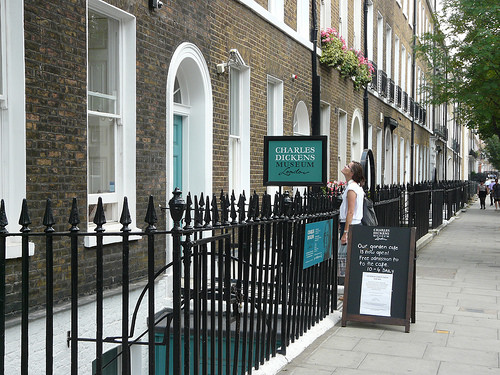Charles Dickens Museum
If you’re a literary fan, you cannot visit London without slipping into the Charles Dickens Museum for the afternoon (certainly no more, it’s not the largest of museums). Located in the northern area of the city, in Holborn (48 Doughty Street), the museum is housed in a typical Georgian terrace. Quite unassuming from the front, the inside is home to plenty of treats.

There are fans of Dickens’ work all over the world and a visit to this museum will not disappoint them. The library in particular is a huge attraction, containing many copies of his most famous works. The house provides a truly unique insight into Dickens’ world and you will struggle to find anywhere where his presence is more prominently felt.
A History
Shortly after their marriage, Dickens lived in this house with his wife Catherine from 1837 to 1839. The elder two of Dickens’ daughters were born at this very address: Mary Dickens and Kate Macready Dickens. Catherine’s sister, Mary, also lived with them for a time. At this point in history, it was not uncommon for the sister-in-law to move in with a newly married couple to offer support and help in their early marriage. Dickens and Mary were firm friends and she became a fixture in many of his books. She became very ill in 1837 and died in Dickens’ arms. He fictionalised her death as that of Little Nell.
As Dickens’ wealth increased and his family grew, this four-floor house became too small and the family moved on to a new home in London. However, 48 Doughty Street is the only house of his that still stands today. The building was threatened with demolition in 1923 but the Dickens Fellowship managed to save it by raising the money to buy the property’s freehold. The house was then extensively renovated under the watchful eye of an independent trust.
The museum opened back in 1925 and has enjoyed a steady flow of visitors ever since due to its impressive collection of more than 100,000 items relating to the work of the great writer.
Inside the House
Spread over the four floors of this fantastic house, there is the most incredible collection of paintings, manuscripts and rare editions related to the life’s work of Dickens. Perhaps the most famous exhibit is the portrait of Dickens pained by RW Buss, known as ‘Dickens’ Dream’. The portrait is unfinished and shows Dickens in his study, surrounded by many of the characters that he created for his stories.
While he lived in the house, Dickens completed The Pickwick Papers, wrote Oliver Twist and Nicholas Nickleby and also did some work on Barnaby Rudge. It was obviously a place of great inspiration for the author.
Museum Café
The museum café is based in a light and airy extension of the house and it features a very pleasant outdoor courtyard with seating. You do not necessarily have to be a museum visitor to use the café as it is open to everyone.
The museum is open from 10am – 5pm seven days a week. all year round. Private viewings can be arranged for groups of 10 people or more after 5pm each day.

